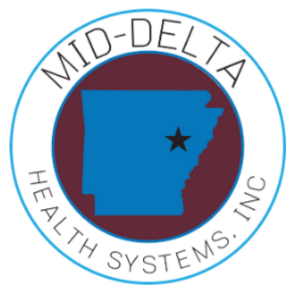Many areas of rural Arkansas are considered HIV deserts, which are locations that offer no HIV care. Mid-Delta Health Systems, a community health center in the rural mid-Arkansas Delta, is working to eliminate the HIV desert in their community. Through a PCHP grant, Mid-Delta is developing education related to HIV prevention, treatment, and risk reduction. While specifically designed for healthcare professionals, patients, and the community in this rural area of Arkansas, the information is available for everyone.
Modules
HIV 101
Welcome to HIV 101! In this course, you will learn the basics about HIV (human immunodeficiency virus), including how it is transmitted, how it affects the body, and how to stop its spread. HIV is a virus that attacks the immune system, making it harder for the body to fight off infections and diseases. HIV is a severe condition, but with proper treatment, people with HIV can live long and healthy lives. By the end of this course, you should better understand HIV and how to protect yourself and others from infection.
HIV 102
Welcome to HIV 102, where we will delve deeper into the care of individuals living with HIV/AIDS and those who require intervention to prevent infection. Building upon the foundational information learned in HIV 101, this module will provide an in-depth look at antiretroviral therapy (ART), its benefits, and the treatment guidelines associated with HIV/AIDS.
In addition to understanding the goals of ART use, we will also explore the prevention and treatment of opportunistic infections. We will also discuss the complexities of HIV/AIDS, including its co-occurrence with mental health and substance use, which can have a negative impact on public health.
By the end of this module, you will have a deeper understanding of the care required for individuals living with HIV/AIDS, as well as the prevention and intervention strategies necessary to combat the spread of this disease.
HIV 103
In recent years, the use of pre-exposure prophylaxis (PrEP) has revolutionized HIV prevention, and it is a game changer in the fight against HIV transmission. PrEP is a medication regimen that involves taking antiretroviral drugs to reduce the risk of HIV infection in people who are at high risk of contracting HIV.
In this course, we will dive deep into the five areas of PrEP prescribing practices and discuss common laboratory tests associated with PrEP and the potential side effects of PrEP medication. You will also learn the importance of communication between healthcare providers and patients to ensure successful PrEP treatment.
Join us on this journey to learn how to provide effective and comprehensive care to patients at high risk of contracting HIV.
HIV 104
The End of the HIV Epidemic in the US (EHE), announced in 2019, aims to end the HIV epidemic in the US by 2030, Strategies are being aggressively implemented to make this a reality. Through Ryan White Care Act funds, the ability to access quality care through various core and supportive services has caused individuals living with HIV/AIDS to live long, full lives.
In this module, we will look at a critical aspect of HIV/AIDS care, case management. We will review what HIV Case Management is, and what role it has at the end of the HIV epidemic plan. We will then focus on the components of a case management program. Lastly, we will take a glimpse at harm reduction and the interventions that support these efforts.
HIV 105
Welcome to Module 5 of our comprehensive course on Motivational Interviewing (MI) in healthcare! In this module, we will lay the foundation for understanding the essence of MI, its profound impact on the provider-patient relationship, and how it can be a transformative tool in promoting positive behavior change, particularly in HIV treatment and care.
HIV 106
In module 6, we examine the legal view of HIV in Arkansas. Understanding HIV laws helps individuals know their legal responsibilities, including disclosure requirements, testing protocols, and potential criminal liabilities. This knowledge allows people living with HIV to navigate relationships and interactions with others in a way that complies with the law and the legal responsibilities of healthcare providers. HIV laws are designed to protect the rights of individuals living with HIV. Awareness of these laws allows individuals to advocate for their rights, ensuring fair employment, housing, and healthcare treatment.
